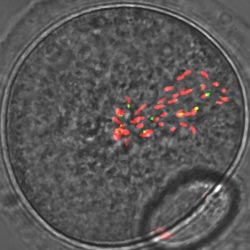Molecular Glue Controls Chromosome Segregation in Oocytes

Aneuploid Mouse Egg Cell<br>
If this mechanism is impaired in oocytes, it can result in chromosome missegregation and production of aneuploid fetuses, leading to abnormalities like Down’s syndrome (trisomy 21), Edward’s syndrome (trisomy 18) or Klinefelter’s syndrome (XXY).
The IMBA researcher Kikue Tachibana-Konwalski and her team together with collaborators from the University of Oxford have now discovered that the proper functioning of the SAC in mammalian oocytes depends on the “molecular glue” called cohesin.
Cohesin is essential to hold replicated chromosomes together. Using molecular “scissors” in the form of TEV protease, the researchers inactivated cohesin to generate chromosomes that cannot bi-orient on the spindle and therefore would be expected to activate a checkpoint response and trigger a cell cycle arrest.
Instead, they found that oocytes in which cohesin has been destroyed still divide and produce highly aneuploid eggs. Therefore, cohesin is required for a robust SAC in oocytes. This has important implications for ageing oocytes, where cohesin deterioration will compromise the SAC, leading to chromosome segregation errors.
Original publication in “Current Biology”: “Spindle Assembly Checkpoint of Oocytes Depends on a Kinetochore Structure Determined by Cohesin in Meiosis I”
Kikue Tachibana-Konwalski
Kikue Tachibana-Konwalski was educated in Austria, Japan and the UK. She obtained a BA Hons in Natural Sciences with specialization in Genetics and a PhD in cell cycle and cancer research from Cambridge University. For her postdoctoral research in Kim Nasmyth’s lab in Oxford, she pioneered the use of TEV protease technology in the mouse to study cohesin in female germ cells. Kikue is a group leader at IMBA since November 2011. Her research focuses on the molecular control of the oocyte-to-zygote transition with the goal of understanding female age-related aneuploidy and infertility.
IMBA:
The Institute of Molecular Biotechnology (IMBA) combines fundamental and applied research in the field of biomedicine. Interdisciplinary research groups address functional genetic questions, particularly those related to the origin of disease. IMBA is a subsidiary of the Austrian Academy of Sciences, the leading organization promoting non-university academic basic research in Austria. IMBA was voted as second to top international workplace for postdoctoral researchers, by readers of the US based and online life sciences magazine, The Scientist. imba.oeaw.ac.at
Austrian Academy of Sciences (ÖAW):
Within the Austrian Academy of Sciences, renowned researchers from 28 research institutions have formed a comprehensive knowledge pool covering a wide array of disciplines for the sake of progress in science as a whole. All of the Academy's activities are closely networked at national, EU, and international level with university and non-university partners.
www.oeaw.ac.at
Media Contact
All latest news from the category: Life Sciences and Chemistry
Articles and reports from the Life Sciences and chemistry area deal with applied and basic research into modern biology, chemistry and human medicine.
Valuable information can be found on a range of life sciences fields including bacteriology, biochemistry, bionics, bioinformatics, biophysics, biotechnology, genetics, geobotany, human biology, marine biology, microbiology, molecular biology, cellular biology, zoology, bioinorganic chemistry, microchemistry and environmental chemistry.
Newest articles

“Nanostitches” enable lighter and tougher composite materials
In research that may lead to next-generation airplanes and spacecraft, MIT engineers used carbon nanotubes to prevent cracking in multilayered composites. To save on fuel and reduce aircraft emissions, engineers…

Trash to treasure
Researchers turn metal waste into catalyst for hydrogen. Scientists have found a way to transform metal waste into a highly efficient catalyst to make hydrogen from water, a discovery that…

Real-time detection of infectious disease viruses
… by searching for molecular fingerprinting. A research team consisting of Professor Kyoung-Duck Park and Taeyoung Moon and Huitae Joo, PhD candidates, from the Department of Physics at Pohang University…





















